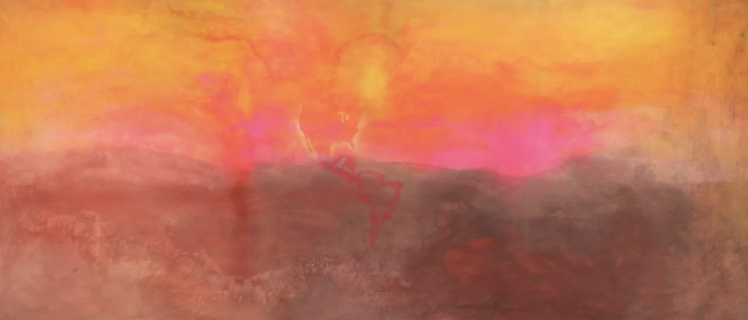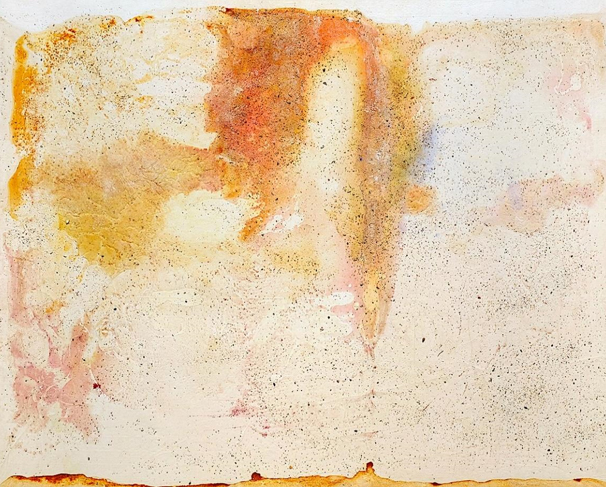

Elaborating on my wish list, I wish for student painters to see in Bowling’s canvases that he evokes our Land of Many Waters from flowing rivers to slushy, mucky trenches. I wish for them to see in his object-laden canvases as their mind tells them, and for them to see how the map of South America, the delineation of Dear Land of Guyana, and the colonial wooden architecture with Demerara shutters have appeared, almost disappeared, and reappeared on some of his canvases. Similarly, I wish for student artists to see how Guyana-born New York-based Weithers has used the contours of the land after a protracted period of sunshine without rain as a point of departure for chromatically rich canvases and for them to ponder how the sharpness of Guyana’s near-equatorial light has informed his recent white paintings. My wish is for these wonderful paintings by both Bowling and Weithers to be seen without mediation by the photographer’s lens and the print on the page or the limits of the laptop’s screen.
Another wish for student painters – in fact, all of us – is for the hidden-away gems in institutional collections to be accessible in being displayed publicly and for there to be public outreach and education about these works. To mark the beginning of our current millennium, as many pondered whether the world would be plunged into chaos due to anticipated software systems malfunction with the change from ‘99 to ’00, a certain bank displayed its vast art collection of mostly paintings at three Georgetown locations. The exhibition, as I recall it, presented excellent work by little-known Guyanese artists alongside work by more established artists. After the exhibition opened I recall standing in the bank lines unperturbed about their length or slow-shortening pace because all around me were images I, with my head tilted upwards, studied. Of course, the paintings were too high for proper study and the location with work at eye level was not open for very long. Slowly, but surely the orientation of the paintings hung in the branches became askew and eventually they were removed. Today, I wonder, where are the paintings?
Dear Institutional Art Collectors, I humbly come before you and ask on behalf of my community of artists that as you acquire our work, you do so with the sensitivity of one being granted the opportunity to foster a child whose parent loves and treasures them but has the misfortune of having to entrust them in the care of another. Our creations as artists are not the works of idle minds or apathetic hearts. Quite the contrary. They are also extensions of our humanity. They are our children. So, when you do not care for them well, we ache for the extension of self we entrusted in your care.
Dear Institutional Art Collectors, we do not entrust our work in your care (despite the sum you may have paid) so the work can be hidden away. No! We want the work to be seen! We want them to have an audience so that it may inspire thought and feeling. Hidden away in back rooms and storage, stifles the communication we attempted with our brushes and paint; mallet and chisel; graphite and paper. Hidden away in back rooms, our children cannot speak, however, imperfectly or incompletely they may do so; they are silenced without an audience. Let our children be seen so they may speak and be heard. As parents, we entrust our children in your care because we feel your institutional status will allow our children the best that can be afforded them: audiences and wall spaces or plinths to be displayed so that the conversations we started in the solitude of our mind and which we continued in our studio could be enlivened with audience recognition of our discourse.
Dear Institutional Art Collectors, your collections should be seen as treasure and alas treasures should be stored well and every effort made to maintain their original luster. Don’t allow the paint to dull from overexposure to sunlight or under imperceptible layers of dust. Don’t store the canvases in a manner so they may be damaged by any of the innumerable critters that we Guyanese on the fringes of a rich ecosystem must cohabit with. It is so sad when as artists, we know certain of our children are with you hidden away, damaged, and neglected. But such is the lament of the parents who gladly allowed you to acquire their work.
——
In last week’s article Eye of the Storm: Circulos Vibrante, I misspelled the artist’s name which should have read as Carl F Anderson. Apologies to Mr Anderson.






